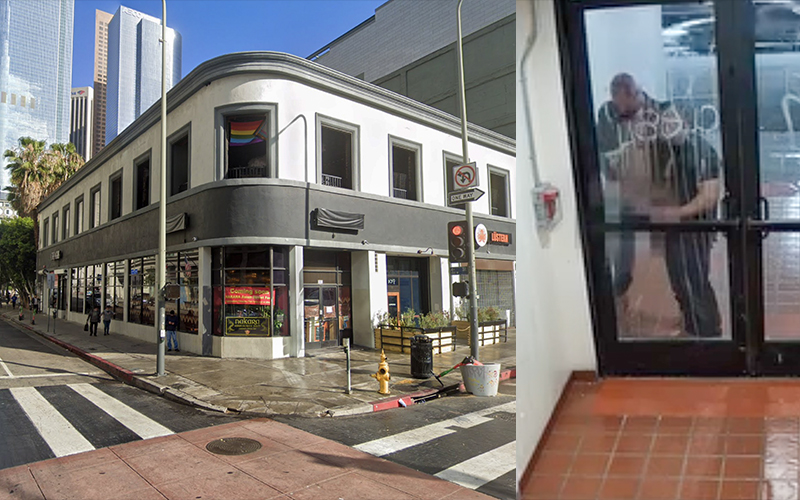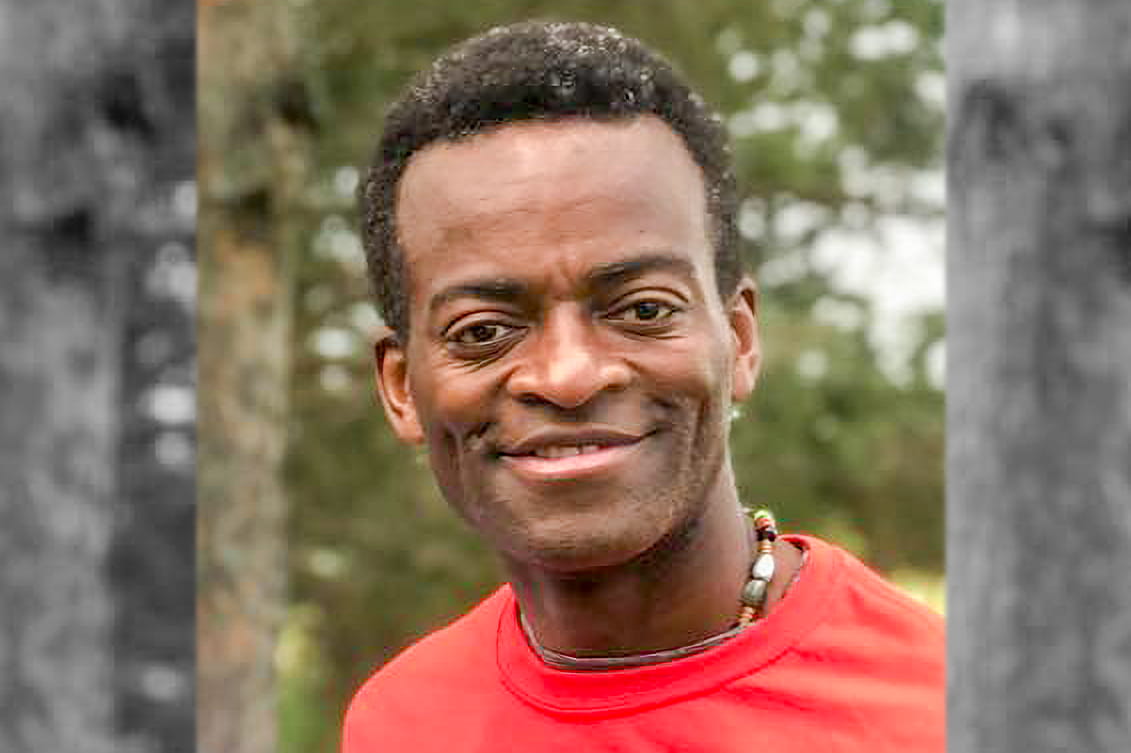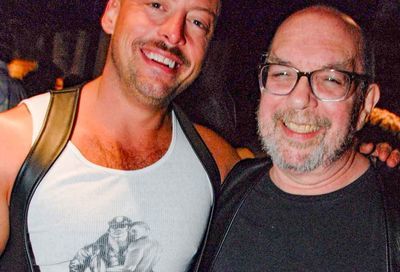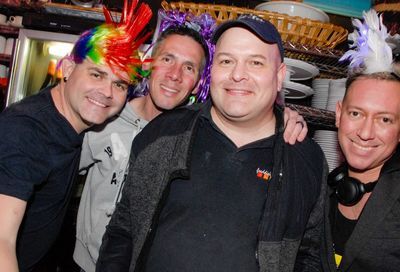Film Review: ‘End of the Century’ is a sweet and sexy gay romance
"End of the Century" explores a world of what-ifs for two handsome strangers
By André Hereford on November 7, 2019 @here4andre

Barely a word is spoken in the first twelve minutes of End of the Century (Fin de Siglo) (★★★★☆), the sensual, Barcelona-set debut feature by Argentinian writer-director Lucio Castro. The camera wanders the city alongside solo traveler Ocho (Juan Ballerini), quietly absorbing the city’s sights and culture, whether people-watching from the balcony of his Airbnb, or on meandering walks along the seaside and among the pines topping Montjuïc.
A stranger in a Kiss t-shirt, passing through the square below Ocho’s apartment, catches his eye. Later, he and “Kiss” cruise each other on the city beach. Their first hookup is as inevitable as it is hot, and brief. But Ocho and the stranger, Javi (Ramón Pujol), a Barcelona native visiting from his current home in Berlin, exchange numbers in hopes of a future encounter that soon materializes. And the movie starts to make up for its wordless beginning, as the two travelers traverse the city, engaging in that dance of conversation, casual but defining, that marks the first stirrings of romance.
Romance might not be where their hookup, and this film, are headed, though. Ocho, an Argentinian poet who makes his living in marketing in New York, says he’s just out of a 20-year relationship, and Javi also isn’t interested in more than a casual thing before he returns to life in Berlin. Yet, their attraction is undeniable, as is the chemistry between Ballerini and Pujol, be it while sharing an impromptu sunset picnic, or during the film’s steamy sex scenes. Castro’s script conjures scenarios that could be ripped from porn or Playgirl fantasies — like, for instance, summoning a willing, good-looking passerby up to your Airbnb at a moment’s notice — but the direction and performances convey a natural, open sexuality that feels tender and authentic.
The movie coaxes out possibilities for the lovers’ future, or at least future hookups, then swerves suddenly, backtracking 20 years to Ocho and Javi’s past, to reveal that the two supposed strangers actually had met once before. It’s 1999, and they both happen to be in Barcelona. On the eve of the new century, a good portion of the modernized world is consumed with the fear that every computer on earth will shut down, and civilization might grind to a pause, at the moment date-clocks should strike 01-01-00.
Future, hopefully wiser generations might look back and laugh at the absurd Y2K scare, but Castro makes smart use of that singular moment in history as a legitimate trigger for contemplating transition. Even a realist like Ocho, who doesn’t take the hysteria seriously, might consider how life can change with the turn of the century. He might wonder whether he wants to dive into a relationship or jet around the world as unattached as can be, or maybe marry a woman like his friend Sonia (Mía Maestro). Ocho is privileged with freedom and potential when he meets Javi in 1999. His actions that weekend make all the difference in their paths going forward.
Shifting in time again, End of the Century contemplates more than one possible path for Ocho and Javi from the end of the 20th-century until now. The film signals those alternative shifts through subtle — sometimes too subtle — shifts in music or time of day, or by altering details like the contents of the apartment refrigerator. Each scene and frame rewards close observation, as the film as a whole also gains upon repeat viewing. The love story is simple but it captures the depth of possibility that can underscore even the most offhand decision to leave or stay, to hold back or act.
Passages throughout are as dialogue-free as the opening, and equally picturesque, courtesy of cinematographer Bernat Mestres. When the pair do get to talking, they can go on, but their rapport is inviting, and their concerns universal. Ballerini and Pujol aren’t charged to do much heavy dramatic lifting, but rather achieve a warmth and ease that still is deceptively hard to create on-camera. Debating, kissing, or drunkenly dancing around the apartment, Ocho and Javi make good hangout company, as twentysomething dreamers and 20 years later, for the movie’s musing look at what was, what is, and what might have been.
End of the Century is not rated, and opens Friday, Nov. 8 at Landmark’s E Street Cinemas. Visit www.landmarktheatres.com/washington-d-c.
Councilmember Resigns After Peeing on Gay Bar
A gay councilmember has resigned his post after being accused of urinating outside Precinct, a popular gay bar in downtown Los Angeles.
By John Riley on March 18, 2024 @JRileyMW
At around 2 a.m. on March 9, a security camera outside of Precinct, a gay bar in downtown Los Angeles, caught two men dressed in black and carrying cocktail glasses walking around the corner from the bar's main entrance. They entered an exterior hallway leading to the bar's employee entrance.
The men set their glasses on a nearby railing, unzipped their pants, and appeared to urinate in a corner between the door and the entranceway.
In the video, two other men are seen passing by the entranceway but not entering it, just moments as the taller of the two men appears to zip up his fly and looks around furtively. The video cuts out shortly after that.
Syphilis Cases Soar Among Gay and Bisexual Men
The U.S. is seeing over 200,000 syphilis cases annually, the highest figure since the 1950s.
By Ramsey Pfeffinger on March 24, 2024
The United States is now seeing over 200,000 syphilis cases annually, the highest figure since the 1950s.
Imagine the voice of Golden Girls’ Sophia Petrillo saying, “Picture it, United States 1951, I Love Lucy was kicking off its first season, super glue had just been invented, and there were 140,000 syphilis cases reported across the country.”
By 2000, however, decades of public health advocacy and medical advancements, such as the use of antibiotics in early treatment, had cut down cases to just 32,000 per year.
So, what happened? Why are the numbers worse now than they were 24 years ago?
Principal Sued for Threatening to Kill Gay Couple’s Son
A federal lawsuit alleges a Milwaukee school administrator threatened and abused a student because the boy's parents are gay.
By John Riley on March 28, 2024 @JRileyMW
A Milwaukee school principal has been sued in federal court by a gay couple who allege he bullied, harassed, threatened, and assaulted their son for having two same-sex parents, violating the child's civil rights in the process.
The parents, referred to as M.P. and T.L. in the lawsuit, claim that Kasongo Kalumbula allegedly mistreated their son because of his family's makeup.
The lawsuit, filed last week in the U.S. District Court for the Eastern District of Wisconsin, asks for a jury trial and seeks an undetermined amount in damages.
It alleges that Kalumbula, who served as the assistant principal, and later, acting principal, of the Milwaukee French Immersion School from September 2018 to October 2021, physically and verbally abused the child -- who was in first grade when the harassment started -- and routinely singled him out for discipline.
Support Metro Weekly’s Journalism
These are challenging times for news organizations. And yet it’s crucial we stay active and provide vital resources and information to both our local readers and the world. So won’t you please take a moment and consider supporting Metro Weekly with a membership? For as little as $5 a month, you can help ensure Metro Weekly magazine and MetroWeekly.com remain free, viable resources as we provide the best, most diverse, culturally-resonant LGBTQ coverage in both the D.C. region and around the world. Memberships come with exclusive perks and discounts, your own personal digital delivery of each week’s magazine (and an archive), access to our Member's Lounge when it launches this fall, and exclusive members-only items like Metro Weekly Membership Mugs and Tote Bags! Check out all our membership levels here and please join us today!
The Magazine
-
Most Popular
 LGBTQ Websites Could Be Sued Under Kansas Anti-Porn Law
LGBTQ Websites Could Be Sued Under Kansas Anti-Porn Law  Aaron Rodgers Suggests AIDS Was Created by U.S. Government
Aaron Rodgers Suggests AIDS Was Created by U.S. Government  Conservative Ad Makes Case for Transgender Rights
Conservative Ad Makes Case for Transgender Rights  Maulik Pancholy Responds to School District Canceling Him
Maulik Pancholy Responds to School District Canceling Him  Biden's New School Rules Protect LGBTQ Students
Biden's New School Rules Protect LGBTQ Students  Mississippi Man Accused of Slaughtering Ex-Boyfriend
Mississippi Man Accused of Slaughtering Ex-Boyfriend  School Board Cancels '30 Rock' Star's Anti-Bullying Talk
School Board Cancels '30 Rock' Star's Anti-Bullying Talk  Star Trek Discovery's Wilson Cruz Keeps Making Television History
Star Trek Discovery's Wilson Cruz Keeps Making Television History  Gay Man Jailed in Qatar Being "Tortured," According to Brother
Gay Man Jailed in Qatar Being "Tortured," According to Brother  Grindr's New Feature "Roam" Connects Users Around the Globe
Grindr's New Feature "Roam" Connects Users Around the Globe
 Maulik Pancholy Responds to School District Canceling Him
Maulik Pancholy Responds to School District Canceling Him  Biden's New School Rules Protect LGBTQ Students
Biden's New School Rules Protect LGBTQ Students  School Board Cancels '30 Rock' Star's Anti-Bullying Talk
School Board Cancels '30 Rock' Star's Anti-Bullying Talk  Aaron Rodgers Suggests AIDS Was Created by U.S. Government
Aaron Rodgers Suggests AIDS Was Created by U.S. Government  LGBTQ Websites Could Be Sued Under Kansas Anti-Porn Law
LGBTQ Websites Could Be Sued Under Kansas Anti-Porn Law  HRC's Kelley Robinson Makes the Time 100 List
HRC's Kelley Robinson Makes the Time 100 List  Grindr's New Feature "Roam" Connects Users Around the Globe
Grindr's New Feature "Roam" Connects Users Around the Globe  Kansas Governor Vetoes Trans Health Care Ban
Kansas Governor Vetoes Trans Health Care Ban  Court Blocks West Virginia Trans Athlete Ban
Court Blocks West Virginia Trans Athlete Ban  DC Black Pride 2024: Everything You Need to Know
DC Black Pride 2024: Everything You Need to Know
Scene
Metro Weekly
Washington's LGBTQ Magazine
P.O. Box 11559
Washington, DC 20008 (202) 638-6830
About Us pageFollow Us:
· Facebook
· Twitter
· Flipboard
· YouTube
· Instagram
· RSS News | RSS SceneArchives
- "We use cookies and other data collection technologies to provide the best experience for our customers. You may request that your data not be shared with third parties here: "Do Not Sell My Data
Copyright ©2024 Jansi LLC.









